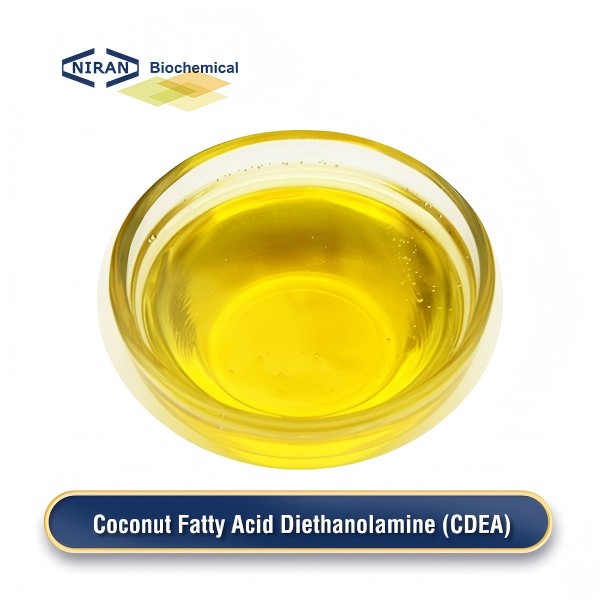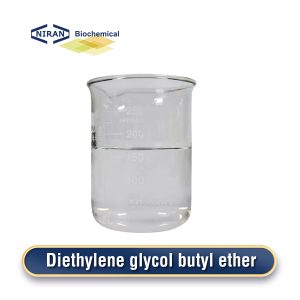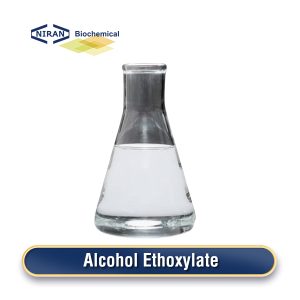Coconut Fatty Acid Diethanolamine / CDEA
- CAS Number: 68603-42-9
- Chemical Formula: C14H31NO2
- MOQ: 1000KG
- Shelf Life: 2 years
- Synonyms: Diethanolamide of Coconut Oil, Coconut Oil Diethanolamine, Diethanolamine Coconut Oil Amide, Coconut Fatty Acid Diethanolamine
Product Description
What Is Coconut Fatty Acid Diethanolamine?
Coconut Fatty Acid Diethanolamine (CDEA) is a derivative of coconut oil, produced by the reaction of coconut fatty acids with diethanolamine (DEA). In both personal care and industrial products, it is frequently utilized as an emulsifier, foam booster, and surfactant.
Preparation Method:
CDEA is synthesized through an amide formation reaction between fatty acids (extracted from coconut oil) and diethanolamine. The process involves heating coconut fatty acids with DEA in the presence of a catalyst under controlled conditions. The reaction results in the formation of a fatty acid diethanolamide, which is then neutralized, purified, and distilled to obtain the final product.
Related Parameters:
| Item | Standard |
| Active Matter, % | ≥ 78 |
| Free Oil Content, % | ≤ 8 |
| Amine Value, mg KOH/g | ≤ 30 |
| Color, Hazen | ≤ 300 |
| pH Value (10g/L, 10% Ethanol Water Solution) | 9.5-10.5 |
| Water Content, % | ≤ 0.5 |
| Glycerin Content, % | ≤ 10 |
Recommended Dosage of Coconut Fatty Acid Diethanolamine:
| Applications | Dosage |
| Shampoos | 1% – 5% |
| Body Washes | 1% – 3% |
| Facial Cleansers | 0.5% – 2% |
| Conditioners | 0.5% – 2% |
| Bubble Baths | 1% – 3% |
| Emulsions and Creams | 0.5% – 2% |
| Hair Treatments | 1% – 2% |
| Foaming Bath Products | 1% – 4% |
Coconut Fatty Acid Diethanolamine Has Wide Range of Uses:
1. Personal Care Products
- Shampoos: CDEA improves foam stability and enhances the texture of shampoos, providing a richer lather and better cleansing action.
- Body Washes & Soaps: Used as a mild surfactant and foaming agent, it helps create a smooth, creamy lather while being gentle on the skin.
- Conditioners & Hair Treatments: CDEA helps in emulsifying conditioning agents, improving hair texture and manageability, and providing anti-static benefits.
- Facial Cleansers: Facial cleansers help remove impurities while maintaining skin hydration, providing a non-drying and mild cleaning effect.
2. Industrial Applications
- Emulsifiers: Used in the preparation of emulsions, CDEA helps to stabilize mixtures of water and oils, ensuring the uniform distribution of ingredients.
- Industrial Cleaners: CDEA is effective in formulations designed for cleaning grease, oils, and dirt from industrial surfaces, thanks to its surfactant properties.
3. Household Products
- Detergents: CDEA is included in laundry detergents and dishwashing liquids for its ability to improve the cleaning action and produce a pleasant foaming effect.
- Foaming Bath Products: It is often added to bubble baths and bath gels to enhance the foam quality and sensory experience during use.
4. Other Applications
- Cosmetic Emulsions: Used in emulsions and creams to create stable formulations, improve texture, and increase the viscosity of products.
- Antifoaming Agent: CDEA aids in the management of foam during production operations in industrial formulations.
User Asked Question:
Q: Can CDEA be used in pet care products?
A: Yes, CDEA (Coconut Fatty Acid Diethanolamine) can be used in pet care products, especially in pet shampoos and cleansers. Due to its mild surfactant properties, CDEA is gentle on the skin, making it suitable for pets with sensitive skin. It effectively cleanses without stripping natural oils, leaving the pet’s coat soft, smooth, and well-moisturized, all while being safe for regular use.



